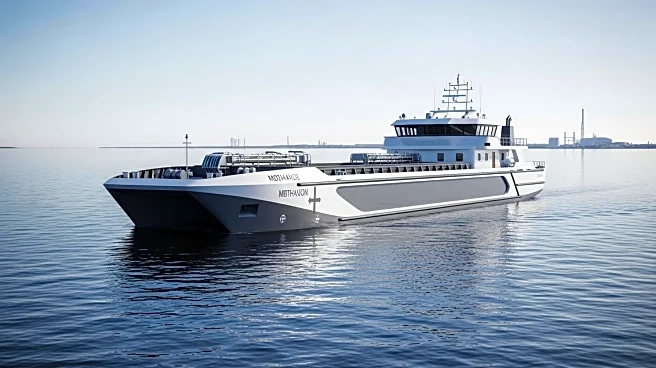What's Happening?
Geely, a Chinese auto manufacturer, has launched its first inland cargo barge that combines methanol and hydrogen electric technology, marking a significant expansion into the maritime sector. The vessel, named Yuanchum 001, was launched at the Hangzhou Qianhang Shipyard and has a capacity of 64 TEU. It operates using liquid methanol technology combined with alcohol-hydrogen electric technology, which Geely has already employed in over 50,000 hybrid electric vehicles. The barge can operate in four different modes, offering a range of nearly 1,000 miles, significantly surpassing the range of current pure electric vessels. This development is part of China's broader investment in electric inland shipping, including plans for recharging stations along the Yangtze River.
Why It's Important?
The launch of Yuanchum 001 represents a pivotal advancement in sustainable maritime technology, potentially reducing energy consumption by 42 percent compared to similar diesel vessels. This innovation aligns with global efforts to reduce carbon emissions and enhance energy efficiency in transportation. Geely's expansion into the maritime sector could influence other industries to adopt similar technologies, promoting a shift towards greener alternatives. The company's investment in methanol-hydrogen technology also supports its international growth strategy, as it seeks to increase its presence in markets such as Europe, Australia, Brazil, and Poland.
What's Next?
Geely plans to continue expanding the applications of its methanol-hydrogen technology in the maritime sector, strengthening its global supply chain through investments in logistics. The company is also targeting increased sales in European markets, supported by its recent launch of LNG-fueled vehicle carriers. As Geely advances its technology, it may face competition from other companies seeking to innovate in the green maritime space. Stakeholders in the shipping industry will likely monitor these developments closely, considering potential collaborations or investments in similar technologies.
Beyond the Headlines
The introduction of hybrid methanol-hydrogen technology in maritime operations could have long-term implications for environmental policy and energy consumption standards. As Geely and other companies continue to innovate, regulatory bodies may need to adapt policies to accommodate new technologies. This shift could also influence cultural perceptions of sustainable practices, encouraging broader acceptance and implementation of green technologies across various sectors.










